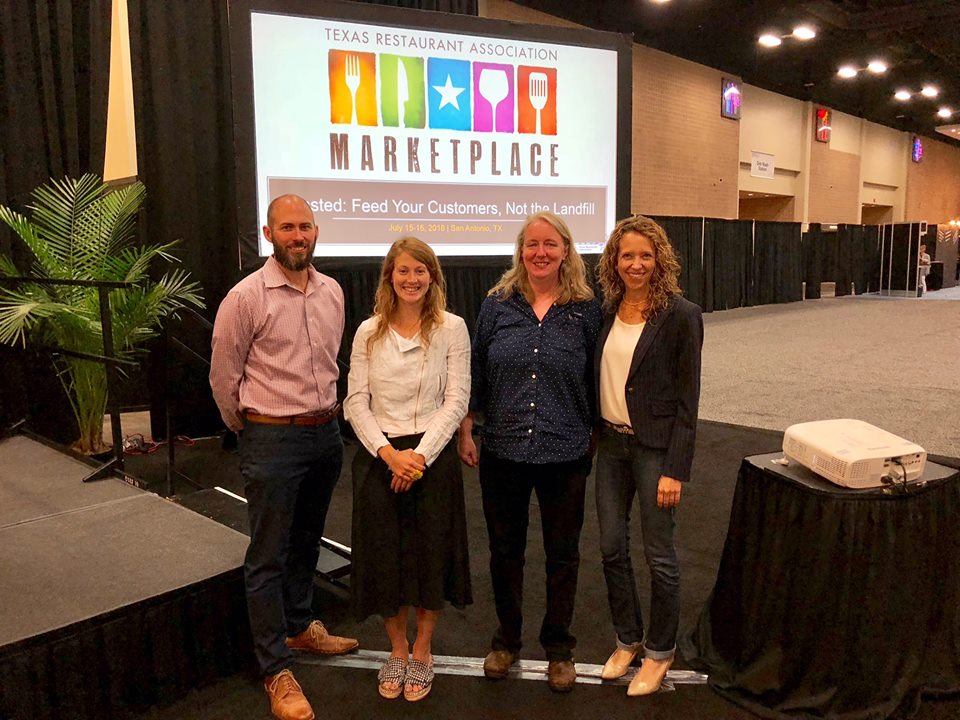Sponsored Post – from Texas Disposal Systems
Texas Disposal Systems (TDS) has been a supporter of the Austin Universal Recycling Ordinance (URO), which requires property owners to ensure its tenants and employees have access to convenient recycling, since its inception in 2013.
With the final phase of the ordinance slated to impact all food enterprises by October 1st, 2018, TDS saw an opportunity to inform local food industry stakeholders at the 80th annual Texas Restaurant Association (TRA) Marketplace, which took place in San Antonio earlier this month. The restaurant and foodservice conference is the largest of its kind in the Southwest and showcased interactive displays, state of the art products and equipment, innovative technology and current trends and advice from successful industry leaders. Each education session featured was designed to offer valuable insight to service industry professionals to improve business operations.
This year, the conference kicked off with a panel discussion – “Wasted: Feed Your Customers, Not the Landfill” – to highlight key learnings and best practices for implementing an organics diversion program. Audience members got to hear about the experiences of representatives from three Austin-based food service enterprises, including Austin ISD, the W Austin hotel and Buzz Mill Coffee. Through consistent, repetitive messaging, strategic waste station locations, and detailed reporting, all three enterprises have seen a significant increase in their landfill diversion while also complying with the city ordinance ahead of the Fall 2018 deadline.
Austin ISD, which is aligned with the City of Austin’s zero waste initiative and aims to reduce landfill waste by 90 percent by 2040, is on track to implement food waste composting in all 130 of their schools by the end of 2018. The school district credits their organics diversion program’s success to keeping the staff and students informed on a consistent basis. Another helpful practice to maximize landfill diversion has been to stock consistent materials such as paper towels in restrooms to prevent contamination. They have also partnered with a range of local environmental organizations such as Keep Austin Beautiful and Eco-Schools USA to implement the most impactful education tactics.
Similarly, the W Austin, which houses 159 residential units, 251 guest rooms, three food/drink establishments and currently stands at a 70 percent diversion rate, partners with local organizations such as Keep Austin Fed to create a culture of reuse and recycling. The hotel also raises awareness by driving quarterly campaigns, such as rewarding residents who compost with gift certificates to on-site dining establishments.
Buzz Mill coffee also grappled with the challenge of identifying a partner to help them comply with Austin’s URO and to implement eco-conscious practices into their day-to-day business. The coffeehouse remains sustainable by utilizing three streams of waste, including composting, recycling, and solid waste. Much like the W and Austin ISD, Buzz Mill has relied on detailed yet understandable signage and consistent training to achieve increased diversion.
The partnership between Texas Disposal Systems and all three organizations showcased in the panel discussion is a true testament to their dedication to both the community and the environment. Given the initiative AISD, W Austin, and Buzz Mill Coffee have put forth to go above and beyond in their diversion efforts, they serve as an excellent resource to help other local businesses ramp up for the final phase of the ordinance. Though some organizations may be uncertain about the unknown the URO brings, Austin-area restaurateurs can rest assured there is adequate support to get a reasonable, eco-friendly organics diversion program in place by October.
To learn more about how TDS can help businesses comply with the URO, please visit texasdisposal.com.
Please note – editorials and sponsored posts are written by guest writers to inform and educate the community on a variety of different viewpoints, as well as to share information about local eco-friendly businesses and organizations. However, they do not necessarily reflect the opinions of the Austin EcoNetwork.


